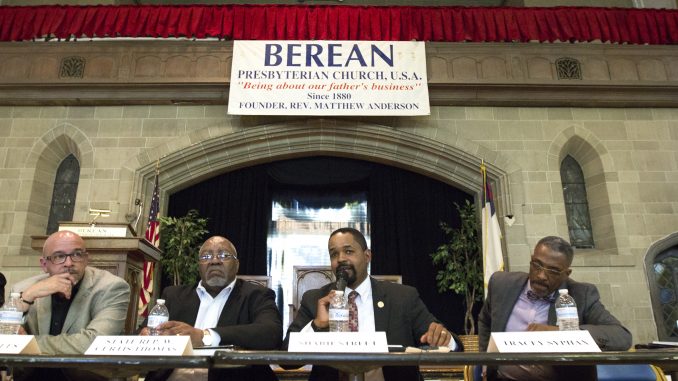
Malcolm Kenyatta has set out to debunk the idea that North Philadelphians living in poverty are “broken people,” he said.
“When we talk about the issue of poverty, we almost speak about it as if there’s some greater character flaw. … This is a generational issue of deep poverty. If you grow up and your family is poor, the statistics will show you, you’re probably going to be poor too.”
“[Impoverished North Philadelphians] aren’t broken people,” Kenyatta said. “These are people that are broke.”
On Monday he sought to aid the situation by bringing elected officials and leaders around the North Philadelphia area to discuss a game plan to fix many issues of deep poverty facing the area.
“There are a lot of groups doing a lot of great stuff, but we’re doing it in silos,” Kenyatta, a 2012 public communication alumnus, said. “What I’ve tried to do is say, ‘How can we work together as nonprofits, government, community leaders?’”
The panel was led by Omar Woodard, the director of the GreenLight Fund. The GreenLight Fund is an organization providing programs to aid high-poverty neighborhoods.
State Reps. W. Curtis Thomas and Leslie Acosta both were on the panel. State Senate candidate Sharif Street was also on the panel as a community leader. Scott Charles, an anti-violence educator from Temple University Hospital and Tracey Syphax, the CEO of Capitol City Contracting joined this panel as well.
Philadelphia has a deep poverty rate of 12.3 percent. This is the highest rate among America’s 10 largest cities, according to a 2015 Inquirer report. Deep poverty is measured as half or less than half of the income of the poverty rate—meaning if a family of four living in poverty made $24,000 a year in income, a family the same size in deep poverty would have earned $12,000 or less, Kenyatta said.
One of the strongest characteristics of deep poverty is food insecurity, which is a family not knowing where its next meal will come from, Kenyatta said. Other issues that families face include basic resource insecurity and toxic stress.
Kenyatta said deep poverty is at its worst in North Philadelphia.
“If you look at the zip codes where deep poverty is the most pervasive, almost all of them are in North Philly,” Kenyatta said.
“[North Philadelphia] is the heart of our city, it houses one of the nation’s best institutions of higher learning and some of the best hospitals, so there’s a lot going on in this area,” he added. “Yet still, we’re dealing with pervasive, prolonged deep poverty.”
The panel had a three-pronged approach to discussing deep poverty: what can be done at the state level, what can be done now and what the vision of North Philadelphia is for five to 10 years from now.
At the panel, Street and Charles both attributed the presence of deep poverty in North Philadelphia to drug use in the 1980s, while other panelists attributed it to a lack of investment at the state level.
Some solutions introduced by Royster included elected state and city officials to require corporations and Temple to employ North Philadelphians on their work as they expand. Charles suggested more funding to schools that have “school-to-prison” pipelines acquire more funding.
“Often when we have these conversations we just focused on the immediate areas that we need to address and maybe some of the past things that caused us to get here,” Kenyatta said. “But if we don’t have a vision of where we’re going, if we don’t have an idea of what we want to be then I think we’re going to be caught in this cycle.”
Woodard said his vision for North Philadelphia is for it to be a “haven” for middle-class African-American families.
“The future of North Philadelphia is it as a ‘destination’ for middle class families who want to find a great job and raise their family in a safe environment,” Woodard said.
Freshman mass media major at Community College of Philadelphia Jocelyn Budd said she attended last night’s meeting so she can be a part of the community’s change.
“[North Philadelphia] is already loving and caring, despite everything you hear on the news,” said Budd, who lives on the corner of 20th and Ontario streets. “I think that if you give people an opportunity to participate in the economical system where they can have jobs and come out of the poverty, it’ll give them more of a purpose.
Kenyatta said this will not be the last panel like this, but will be the beginning of more conversations.
“I want to make make sure that they have the tools to move beyond surviving and really begin to thrive and prosper as a lot of the rest of our city,” he added.
“I’m gonna keep bringing it up wherever I go and ask, ‘What about North Philly?’”
Gillian McGoldrick can be reached at gillian.mcgoldrick@temple.edu or on Twitter @gill_mcgoldrick.


Be the first to comment